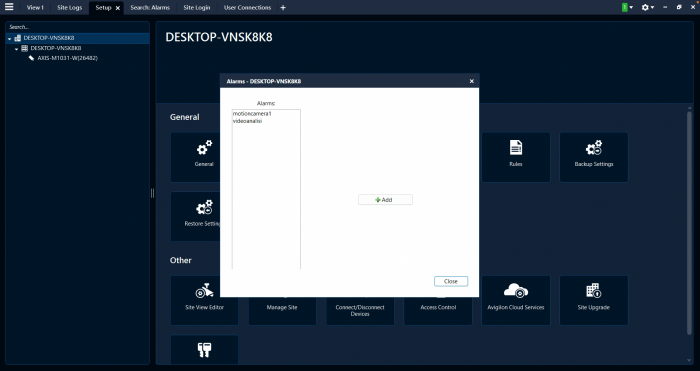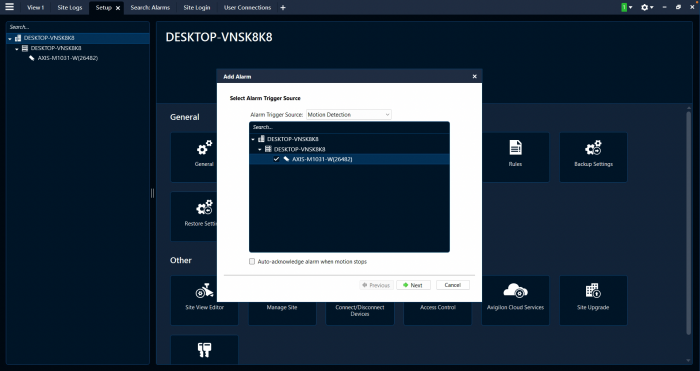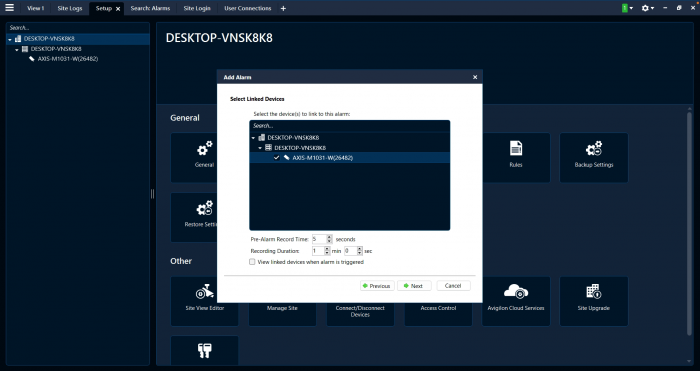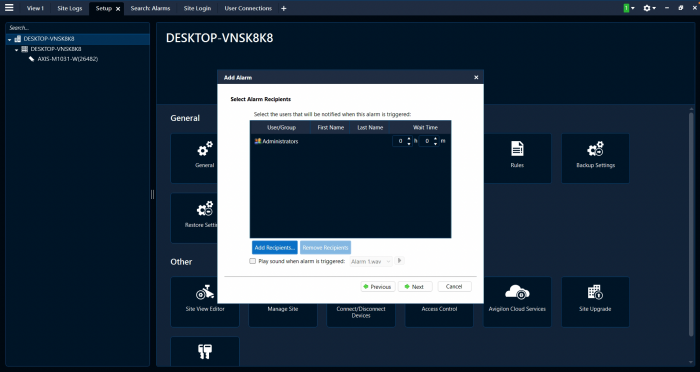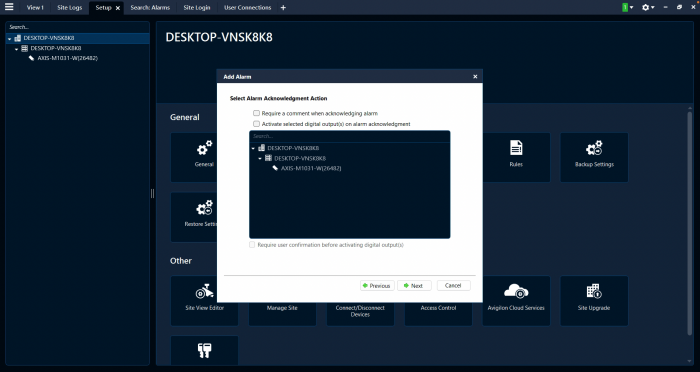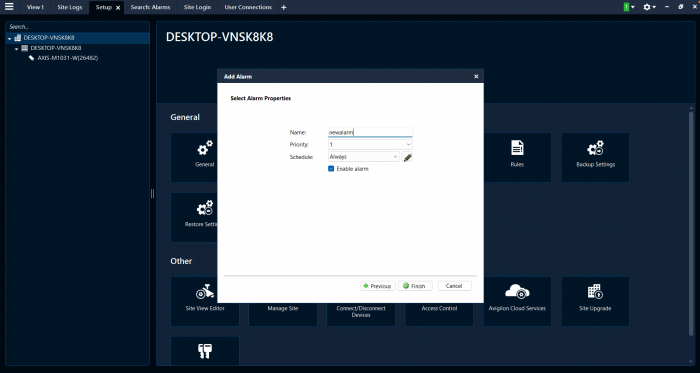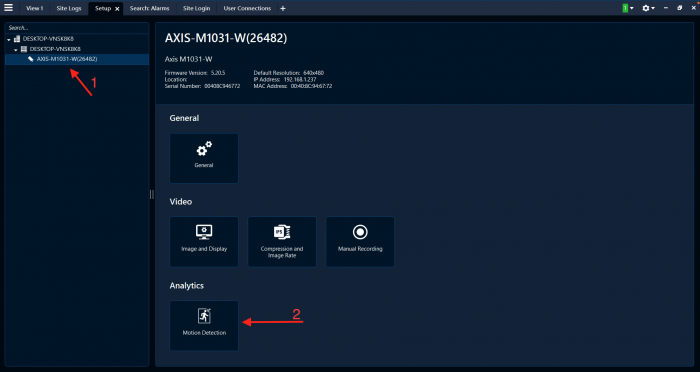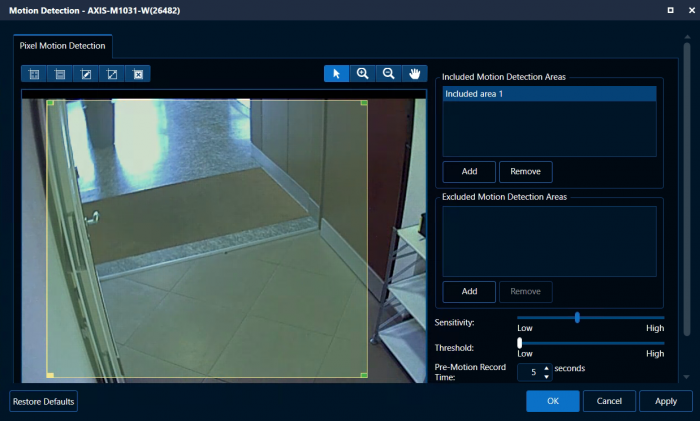Difference between revisions of "AvigilonWEB"
| (47 intermediate revisions by 2 users not shown) | |||
| Line 1: | Line 1: | ||
| − | Avigilon Control Center (ACC) 7 | + | Avigilon Control Center (ACC) 7 and Avigilon Unity (ACC 8) are video management softwares that can be integrated in HSYCO with a TCP/IP connection. |
The current release of the I/O Server has been tested with the Avigilon Control Center WebEndpoint | The current release of the I/O Server has been tested with the Avigilon Control Center WebEndpoint | ||
| Line 10: | Line 10: | ||
Here's an example of how to configure Avigilon Control Center using WebEndpoint to send an alarm status to HSYCO. | Here's an example of how to configure Avigilon Control Center using WebEndpoint to send an alarm status to HSYCO. | ||
| − | [https://www. | + | Download the Avigilon WebEndpoint executable from the [https://www.avigilon.com/software-downloads Avigilon download page] |
| + | |||
| + | [[File:IO Server Avigilon WebEndpoint 1.png|center|700px]] | ||
| + | |||
| + | Install the software | ||
| + | |||
| + | == Creating an alarm in ACC == | ||
| + | |||
| + | Create a new alarm in ACC | ||
| + | |||
| + | [[File:IO Server Avigilon WebEndpoint 2.png|center|700px]] | ||
| + | |||
| + | Select your camera as the trigger source | ||
| + | |||
| + | [[File:IO Server Avigilon WebEndpoint 3.png|center|700px]] | ||
| + | |||
| + | Select your camera as the linked device | ||
| + | |||
| + | [[File:IO Server Avigilon WebEndpoint 4.png|center|700px]] | ||
| + | |||
| + | Select the users that should be notified by ACC | ||
| + | |||
| + | [[File:IO Server Avigilon WebEndpoint 5.png|center|700px]] | ||
| + | |||
| + | Select the alarm acknowledgment action | ||
| + | |||
| + | [[File:IO Server Avigilon WebEndpoint 6.png|center|700px]] | ||
| + | |||
| + | Give the alarm a '''lowercase''' name | ||
| + | {{tip|only use characters from the english alphabet, don't use spaces, the only special characters allowed are - _}} | ||
| + | |||
| + | [[File:IO Server Avigilon WebEndpoint 7.png|center|700px]] | ||
| + | |||
| + | == Creating a Motion Detection in ACC == | ||
| + | |||
| + | Setup a new motion detection under your camera | ||
| + | |||
| + | [[File:IO Server Avigilon WebEndpoint 8.png|center|700px]] | ||
| + | [[File:IO Server Avigilon WebEndpoint 9.png|center|700px]] | ||
| + | |||
| + | == HSYCO Configuration == | ||
| + | Add an AVIGILONAPI I/O Server in the [[Settings#I/O Servers|I/O Servers section of the Settings]] and set its parameters: | ||
| + | |||
| + | === Communication === | ||
| + | *'''IP Address''': IP address of the AVIGILON ACC 7 or AVIGILON UNITY server. | ||
| + | *'''IP Port''': TCP/IP port to use, leave blank to use default port 8443 | ||
| + | |||
| + | === High Availability === | ||
| + | *'''Shutdown when inactive''': defaults to false. | ||
| + | |||
| + | === Options === | ||
| + | *'''username''': Username of the AVIGILON ACC 7 or AVIGILON UNITY client. | ||
| + | *'''password''': Password of the AVIGILON ACC 7 or AVIGILON UNITY client. | ||
| + | *'''userkey''': User api key [https://support.avigilon.com/s/technology-partners Avigilon developer page]. | ||
| + | *'''usernonce''': User api nonce [https://support.avigilon.com/s/technology-partners Avigilon developer page]. | ||
| + | *'''pollingtime''': Time in milliseconds that hsyco will wait before the next alarm check, leave blank or set it o 0 to use default polling time 300 | ||
| + | *'''usessl''': Tells the driver if the webendpoint uses SSL or not, leave blank for true | ||
| + | |||
| + | == Datapoints == | ||
| + | |||
| + | {| class="wikitable" | ||
| + | !ID | ||
| + | !Value | ||
| + | !R/W | ||
| + | !Description | ||
| + | |- | ||
| + | |||
| + | |rowspan="2" |connection | ||
| + | |online | ||
| + | |R | ||
| + | |HSYCO connection socket is open | ||
| + | |- | ||
| + | |offline | ||
| + | |R | ||
| + | |HSYCO cannot create the connection socket | ||
| + | |- | ||
| + | |||
| + | |rowspan="2" |<alarmName>.alarm | ||
| + | |0 | ||
| + | |R | ||
| + | |The alarm is off | ||
| + | |- | ||
| + | |1 | ||
| + | |R | ||
| + | |The alarm is on | ||
| + | |- | ||
| + | |<alarmName>.state | ||
| + | |active, autoacknowledged, acknowledged | ||
| + | |R | ||
| + | |get an alarm state | ||
| + | |- | ||
| + | |<alarmName>.command | ||
| + | |trigger | ||
| + | |W | ||
| + | |triggers an alarm | ||
| + | |- | ||
| + | |<alarmName>.command | ||
| + | |ack | ||
| + | |W | ||
| + | |acks an alarm | ||
| + | |- | ||
| + | |} | ||
| + | |||
| + | == States == | ||
| + | |||
| + | {| class="wikitable" | ||
| + | !Value | ||
| + | !Description | ||
| + | |- | ||
| + | |||
| + | |active | ||
| + | |This state indicates that the motion detection actually detected some movement | ||
| + | |- | ||
| + | |acknowledged | ||
| + | |This state indicates that the camera operator acknowledged the alarm | ||
| + | |- | ||
| + | |autoacknowledged | ||
| + | |This state indicates that motion detection has stopped detecting the movement | ||
| + | |- | ||
| + | |} | ||
| + | |||
| + | == Example == | ||
| + | |||
| + | In this example HSYCO is using the following format to turn on a light when the alarm goes off: | ||
| + | |||
| + | io avigilonapi.newalarm.alarm = 1 : io dummy.light.1 = 1 | ||
| + | Where "avigilonapi" is the name of the driver given in HSYCO | ||
| + | and "newalarm" is the name of the alarm given in ACC | ||
| + | |||
| + | == Release Notes == | ||
| + | === 3.8.0 === | ||
| + | *initial release | ||
| + | |||
| + | ---- | ||
| + | |||
| + | |||
| + | ''AVIGILON is a registered trademark of Avigilon Corporation'' | ||
Latest revision as of 10:24, 20 December 2023
Avigilon Control Center (ACC) 7 and Avigilon Unity (ACC 8) are video management softwares that can be integrated in HSYCO with a TCP/IP connection. The current release of the I/O Server has been tested with the Avigilon Control Center WebEndpoint
![]() This driver supports only a single connection with an Avigilon Control Server. If you have multiple Avigilon Control Servers it is mandatory to add more I/O servers to HSYCO, one for each Avigilon Control Server. Every I/O server must use a different IP address and TCP/IP port.
This driver supports only a single connection with an Avigilon Control Server. If you have multiple Avigilon Control Servers it is mandatory to add more I/O servers to HSYCO, one for each Avigilon Control Server. Every I/O server must use a different IP address and TCP/IP port.
Contents
Communication
Here's an example of how to configure Avigilon Control Center using WebEndpoint to send an alarm status to HSYCO.
Download the Avigilon WebEndpoint executable from the Avigilon download page
Install the software
Creating an alarm in ACC
Create a new alarm in ACC
Select your camera as the trigger source
Select your camera as the linked device
Select the users that should be notified by ACC
Select the alarm acknowledgment action
Give the alarm a lowercase name
![]() only use characters from the english alphabet, don't use spaces, the only special characters allowed are - _
only use characters from the english alphabet, don't use spaces, the only special characters allowed are - _
Creating a Motion Detection in ACC
Setup a new motion detection under your camera
HSYCO Configuration
Add an AVIGILONAPI I/O Server in the I/O Servers section of the Settings and set its parameters:
Communication
- IP Address: IP address of the AVIGILON ACC 7 or AVIGILON UNITY server.
- IP Port: TCP/IP port to use, leave blank to use default port 8443
High Availability
- Shutdown when inactive: defaults to false.
Options
- username: Username of the AVIGILON ACC 7 or AVIGILON UNITY client.
- password: Password of the AVIGILON ACC 7 or AVIGILON UNITY client.
- userkey: User api key Avigilon developer page.
- usernonce: User api nonce Avigilon developer page.
- pollingtime: Time in milliseconds that hsyco will wait before the next alarm check, leave blank or set it o 0 to use default polling time 300
- usessl: Tells the driver if the webendpoint uses SSL or not, leave blank for true
Datapoints
| ID | Value | R/W | Description |
|---|---|---|---|
| connection | online | R | HSYCO connection socket is open |
| offline | R | HSYCO cannot create the connection socket | |
| <alarmName>.alarm | 0 | R | The alarm is off |
| 1 | R | The alarm is on | |
| <alarmName>.state | active, autoacknowledged, acknowledged | R | get an alarm state |
| <alarmName>.command | trigger | W | triggers an alarm |
| <alarmName>.command | ack | W | acks an alarm |
States
| Value | Description |
|---|---|
| active | This state indicates that the motion detection actually detected some movement |
| acknowledged | This state indicates that the camera operator acknowledged the alarm |
| autoacknowledged | This state indicates that motion detection has stopped detecting the movement |
Example
In this example HSYCO is using the following format to turn on a light when the alarm goes off:
io avigilonapi.newalarm.alarm = 1 : io dummy.light.1 = 1
Where "avigilonapi" is the name of the driver given in HSYCO and "newalarm" is the name of the alarm given in ACC
Release Notes
3.8.0
- initial release
AVIGILON is a registered trademark of Avigilon Corporation

